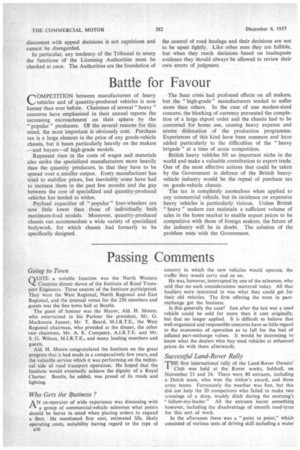Battle for Favour
Page 36

If you've noticed an error in this article please click here to report it so we can fix it.
CIOMPETITION between manufacturers of heavy ....vehicles and of quantity-produced vehicles is now keener than ever before. Chairmen of several " heavy " concerns have emphasized in their annual reports the increasing encroachment on their sphere by the " popular " producers. Of the several reasons for this trend, the most important is obviously cost. Purchase tax is a large element in the price of any goods-vehicle chassis, but it bears particularly heavily on the makers —and buyers—of high-grade models.
Repeated rises in the costs of wages and materials also strike the specialized manufacturers more heavily than the quantity producers, in that they have to be spread over a smaller output. Every manufacturer has tried to stabilize prices, but inevitably-some have had to increase them in the past few months and the gap between the cost of specialized and quantity-produced vehicles has tended to widen.
Payload capacities of " popular " four-wheelers are now little lower than those of individually built maximum-load models. Moreover, quantity-produced chassis can accommodate a wide variety of specialized bodywork, for which chassis had formerly to be specifically designed. The Suez crisis had profound effects on all makers, but the " high-grade " manufacturers tended to suffer more than others. In the case of one modest-sized concern, the blocking of currency prevented the completion of a large ekport order and the chassis had to be converted for home use, causing heavy expense and severe dislocation of the production programme. Experiences of this kind have been common and have added particularly to the difficulties of the "heavy brigade" at a time of acute competition.
British heavy vehicles fill an important niche in the world and make a valuable contribution to export trade. One of the most effective actions that could be taken by the Government in defence of the British heavyvehicle industry would be the repeal of purchase tax on goods-vehicle chassis.
The tax is completely anomalous when applied to any commercial vehicle, but its incidence on expensive heavy vehicles is particularly vicious. Unless British " heavy " makers can maintain a sufficient volume of sales in the home market to enable export prices to be competitive with those of foreign makers, the future of the industry will be in doubt. The solution of the problem rests with the Government.
























































































































